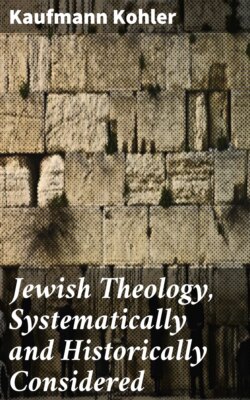Читать книгу Jewish Theology, Systematically and Historically Considered - Kaufmann Kohler - Страница 22
На сайте Литреса книга снята с продажи.
Chapter XXI. God's Truth and Faithfulness
ОглавлениеTable of Contents
1. In the Hebrew language truth and faithfulness are both derived from the same root; aman, “firmness,” is the root idea of emeth, “truth,” and emunah, “faithfulness.” Man feels insecurity and uncertainty among the varying impressions and emotions which affect his will; therefore he turns to the immovable Rock of life, calls on Him as the Guardian and Witness of truth, and feels confident that He will vindicate every promise made in His sight. He is the God by whom men swear—Elohe amen;379 nay, who swears by Himself, saying, “As true as that I live.”380 He is the supreme Power of life, “the God of faithfulness, in whom there is no iniquity.”381 The heavens testify to His faithfulness; He is the trustworthy God, whose essence is truth.382
2. Here, too, as with other attributes, the development of the idea may be traced step by step. At first it refers to the God of the covenant with Israel, who made a covenant with the fathers and keeps it with the thousandth generation of their descendants. He shows His mercy to those who love Him and keep His commandments. The idea of God's faithfulness to His covenant is thus extended gradually from the people to the cosmos, and the heavens are called upon to witness to the faithfulness of God throughout the realm of life. Thus in both the [pg 135] Psalms and the liturgy God is praised as the One who is faithful in His word as in His work.383
3. From this conception of faithfulness arose two other ideas which exerted a powerful influence upon the whole spiritual and intellectual life of the Jew. The God of faithfulness created a people of faithfulness as His own, and Israel's God of truth awakened in the nation a passion for truth unrivaled by any other religious or philosophical system. Like a silver stream running through a valley, the conviction runs through the sacred writings and the liturgy that the promise made of yore to the fathers will be fulfilled to the children. As each past deliverance from distress was considered a verification of the divine faithfulness, so each hope for the future was based upon the same attribute. “He keepeth His faith also to those who sleep in the dust.” These words of the second of the Eighteen Benedictions clearly indicate that even the belief in the hereafter rested upon the same fundamental belief.
On the other hand, the same conception formed the keynote of the idea of the divine truthfulness. The primitive age knew nothing of the laws of nature with which we have become familiar through modern science. But the pious soul trusts the God of faithfulness, certain that He who has created the heaven and the earth is true to His own word, and will not allow them to sink back into chaos. One witness to this is the rainbow, which He has set up in the sky as a sign of His covenant.384 The sea and the stars also have a boundary assigned to them which they cannot transgress.385 Thus to the unsophisticated religious soul, with no knowledge of natural science, the world is carried by God's “everlasting arms”386 and [pg 136] His faithfulness becomes token and pledge of the immutability of His will.
4. At this point the intellect grasps an idea of intrinsic and indestructible truth, which has its beginning and its end in God, the Only One. “The gods of the nations are all vanity and deceit, the work of men; Israel's God is the God of truth, the living God and everlasting King.”387 With this cry has Judaism challenged the nations of the world since the Babylonian exile. Its own adherents it charged to ponder upon the problems of life and the nature of God, until He would appear before them as the very essence of truth, and all heathenish survivals would vanish as mist. God is truth, and He desires naught but truth, therefore hypocrisy is loathsome to him, even in the service of religion. With this underlying thought Job, the bold but honest doubter, stands above his friends with their affected piety. God is truth—this confession of faith, recited each morning and evening by the Jew, gave his mind the power to soar into the highest realms of thought, and inspired his soul to offer life and all it holds for his faith. “God is the everlasting truth, the unchangeable Being who ever remains the same amid the fluctuations and changes of all other things.” This is the fundamental principle upon which Joseph Ibn Zaddik and Abraham Ibn Daud, the predecessors of Maimonides, reared their entire philosophical systems, which were Aristotelian and yet thoroughly Jewish.388
Mystic lore, always so fond of the letters of the alphabet and their hidden meanings, noted that the letters of Emeth—aleph, mem and tav—are the first, the middle, and the last letters of the alphabet, and therefore concluded that God made [pg 137] truth the beginning, the center, and the end of the world.389 Josephus also, no doubt in accordance with the same tradition, declares that God is “the beginning, the center, and the end of all things.”390 A corresponding rabbinical saying is: “Truth is the seal of God.”391
[pg 138]
